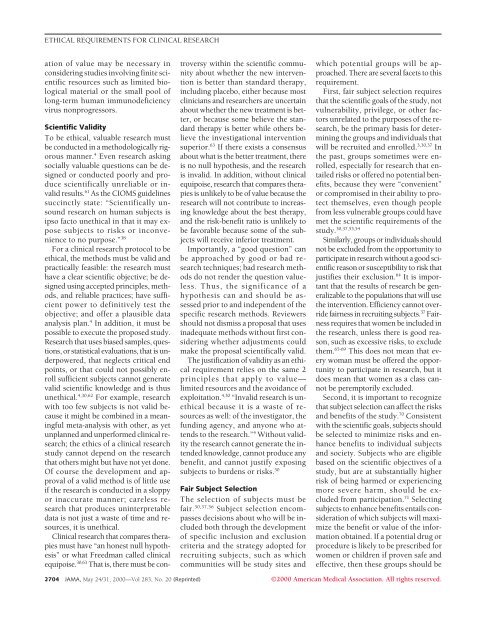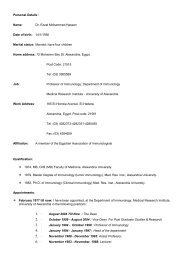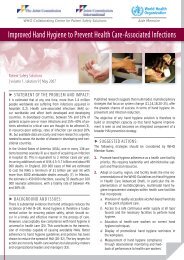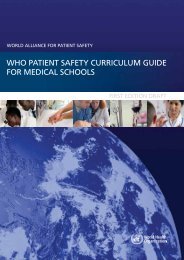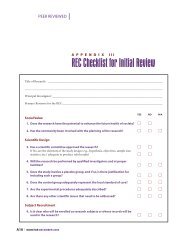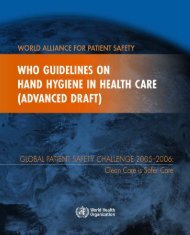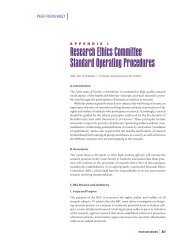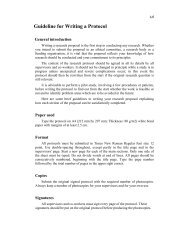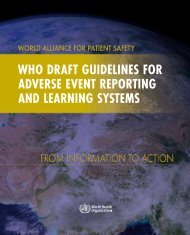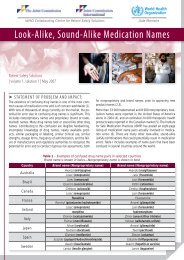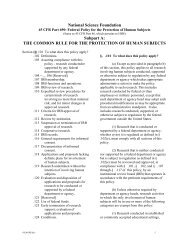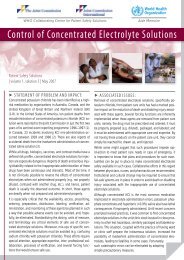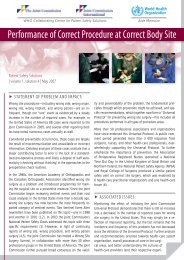What Makes Clinical Research Ethical? - Forum of Ethics Review ...
What Makes Clinical Research Ethical? - Forum of Ethics Review ...
What Makes Clinical Research Ethical? - Forum of Ethics Review ...
Create successful ePaper yourself
Turn your PDF publications into a flip-book with our unique Google optimized e-Paper software.
ETHICAL REQUIREMENTS FOR CLINICAL RESEARCH<br />
ation <strong>of</strong> value may be necessary in<br />
considering studies involving finite scientific<br />
resources such as limited biological<br />
material or the small pool <strong>of</strong><br />
long-term human immunodeficiency<br />
virus nonprogressors.<br />
Scientific Validity<br />
To be ethical, valuable research must<br />
be conducted in a methodologically rigorous<br />
manner. 4 Even research asking<br />
socially valuable questions can be designed<br />
or conducted poorly and produce<br />
scientifically unreliable or invalid<br />
results. 61 As the CIOMS guidelines<br />
succinctly state: “Scientifically unsound<br />
research on human subjects is<br />
ipso facto unethical in that it may expose<br />
subjects to risks or inconvenience<br />
to no purpose.” 38<br />
For a clinical research protocol to be<br />
ethical, the methods must be valid and<br />
practically feasible: the research must<br />
have a clear scientific objective; be designed<br />
using accepted principles, methods,<br />
and reliable practices; have sufficient<br />
power to definitively test the<br />
objective; and <strong>of</strong>fer a plausible data<br />
analysis plan. 4 In addition, it must be<br />
possible to execute the proposed study.<br />
<strong>Research</strong> that uses biased samples, questions,<br />
or statistical evaluations, that is underpowered,<br />
that neglects critical end<br />
points, or that could not possibly enroll<br />
sufficient subjects cannot generate<br />
valid scientific knowledge and is thus<br />
unethical. 4,30,62 For example, research<br />
with too few subjects is not valid because<br />
it might be combined in a meaningful<br />
meta-analysis with other, as yet<br />
unplanned and unperformed clinical research;<br />
the ethics <strong>of</strong> a clinical research<br />
study cannot depend on the research<br />
that others might but have not yet done.<br />
Of course the development and approval<br />
<strong>of</strong> a valid method is <strong>of</strong> little use<br />
if the research is conducted in a sloppy<br />
or inaccurate manner; careless research<br />
that produces uninterpretable<br />
data is not just a waste <strong>of</strong> time and resources,<br />
it is unethical.<br />
<strong>Clinical</strong> research that compares therapies<br />
must have “an honest null hypothesis”<br />
or what Freedman called clinical<br />
equipoise. 30,63 That is, there must be controversy<br />
within the scientific community<br />
about whether the new intervention<br />
is better than standard therapy,<br />
including placebo, either because most<br />
clinicians and researchers are uncertain<br />
about whether the new treatment is better,<br />
or because some believe the standard<br />
therapy is better while others believe<br />
the investigational intervention<br />
superior. 63 If there exists a consensus<br />
about what is the better treatment, there<br />
is no null hypothesis, and the research<br />
is invalid. In addition, without clinical<br />
equipoise, research that compares therapies<br />
is unlikely to be <strong>of</strong> value because the<br />
research will not contribute to increasing<br />
knowledge about the best therapy,<br />
and the risk-benefit ratio is unlikely to<br />
be favorable because some <strong>of</strong> the subjects<br />
will receive inferior treatment.<br />
Importantly, a “good question” can<br />
be approached by good or bad research<br />
techniques; bad research methods<br />
do not render the question valueless.<br />
Thus, the significance <strong>of</strong> a<br />
hypothesis can and should be assessed<br />
prior to and independent <strong>of</strong> the<br />
specific research methods. <strong>Review</strong>ers<br />
should not dismiss a proposal that uses<br />
inadequate methods without first considering<br />
whether adjustments could<br />
make the proposal scientifically valid.<br />
The justification <strong>of</strong> validity as an ethical<br />
requirement relies on the same 2<br />
principles that apply to value—<br />
limited resources and the avoidance <strong>of</strong><br />
exploitation. 4,30 “Invalid research is unethical<br />
because it is a waste <strong>of</strong> resources<br />
as well: <strong>of</strong> the investigator, the<br />
funding agency, and anyone who attends<br />
to the research.” 4 Without validity<br />
the research cannot generate the intended<br />
knowledge, cannot produce any<br />
benefit, and cannot justify exposing<br />
subjects to burdens or risks. 50<br />
Fair Subject Selection<br />
The selection <strong>of</strong> subjects must be<br />
fair. 30,37,56 Subject selection encompasses<br />
decisions about who will be included<br />
both through the development<br />
<strong>of</strong> specific inclusion and exclusion<br />
criteria and the strategy adopted for<br />
recruiting subjects, such as which<br />
communities will be study sites and<br />
which potential groups will be approached.<br />
There are several facets to this<br />
requirement.<br />
First, fair subject selection requires<br />
that the scientific goals <strong>of</strong> the study, not<br />
vulnerability, privilege, or other factors<br />
unrelated to the purposes <strong>of</strong> the research,<br />
be the primary basis for determining<br />
the groups and individuals that<br />
will be recruited and enrolled. 3,30,37 In<br />
the past, groups sometimes were enrolled,<br />
especially for research that entailed<br />
risks or <strong>of</strong>fered no potential benefits,<br />
because they were “convenient”<br />
or compromised in their ability to protect<br />
themselves, even though people<br />
from less vulnerable groups could have<br />
met the scientific requirements <strong>of</strong> the<br />
study. 30,37,53,54<br />
Similarly, groups or individuals should<br />
not be excluded from the opportunity to<br />
participate in research without a good scientific<br />
reason or susceptibility to risk that<br />
justifies their exclusion. 64 It is important<br />
that the results <strong>of</strong> research be generalizable<br />
to the populations that will use<br />
the intervention. Efficiency cannot override<br />
fairness in recruiting subjects. 37 Fairness<br />
requires that women be included in<br />
the research, unless there is good reason,<br />
such as excessive risks, to exclude<br />
them. 65-69 This does not mean that every<br />
woman must be <strong>of</strong>fered the opportunity<br />
to participate in research, but it<br />
does mean that women as a class cannot<br />
be peremptorily excluded.<br />
Second, it is important to recognize<br />
that subject selection can affect the risks<br />
and benefits <strong>of</strong> the study. 70 Consistent<br />
with the scientific goals, subjects should<br />
be selected to minimize risks and enhance<br />
benefits to individual subjects<br />
and society. Subjects who are eligible<br />
based on the scientific objectives <strong>of</strong> a<br />
study, but are at substantially higher<br />
risk <strong>of</strong> being harmed or experiencing<br />
more severe harm, should be excluded<br />
from participation. 71 Selecting<br />
subjects to enhance benefits entails consideration<br />
<strong>of</strong> which subjects will maximize<br />
the benefit or value <strong>of</strong> the information<br />
obtained. If a potential drug or<br />
procedure is likely to be prescribed for<br />
women or children if proven safe and<br />
effective, then these groups should be<br />
2704 JAMA, May 24/31, 2000—Vol 283, No. 20 (Reprinted) ©2000 American Medical Association. All rights reserved.


